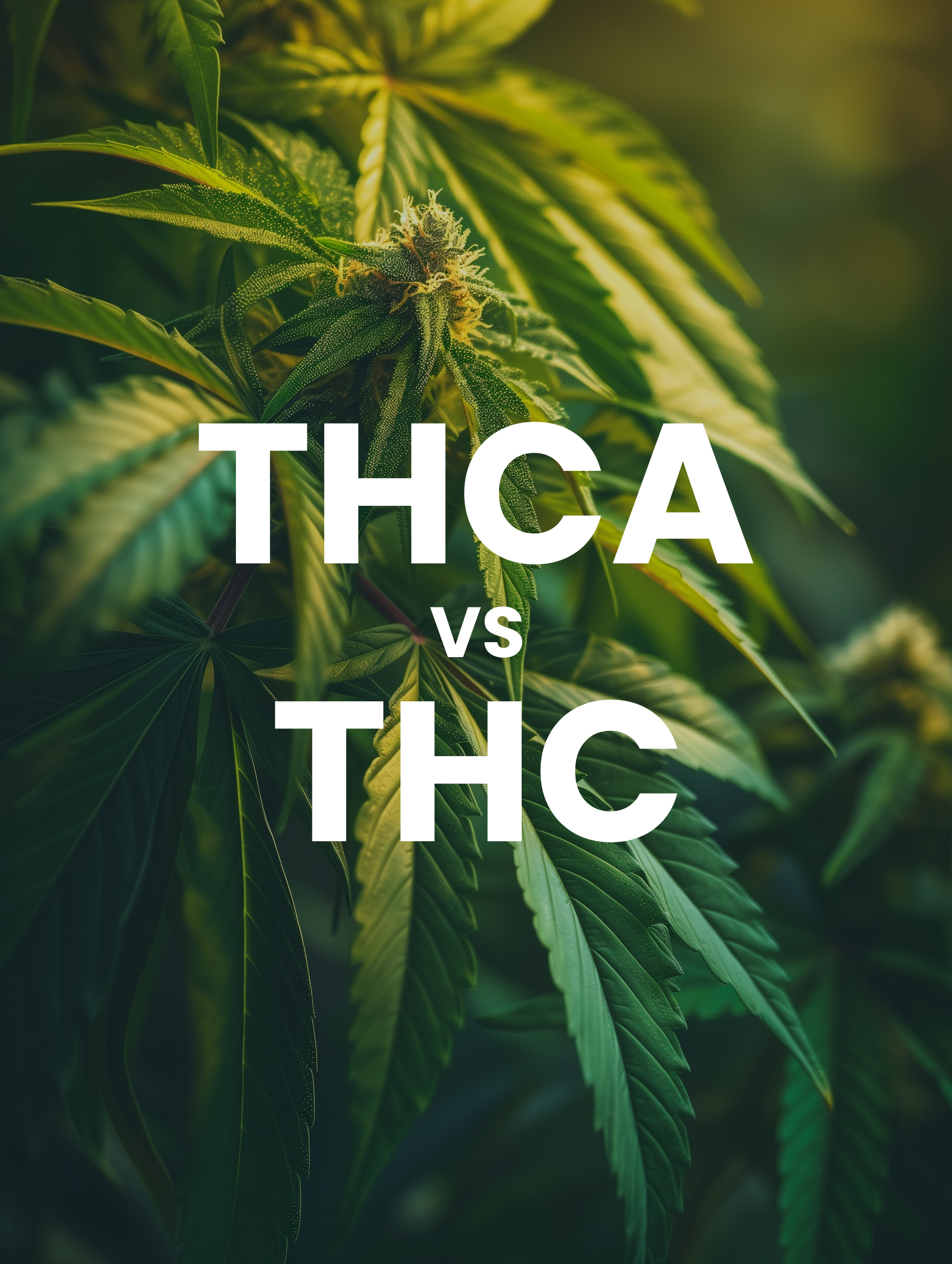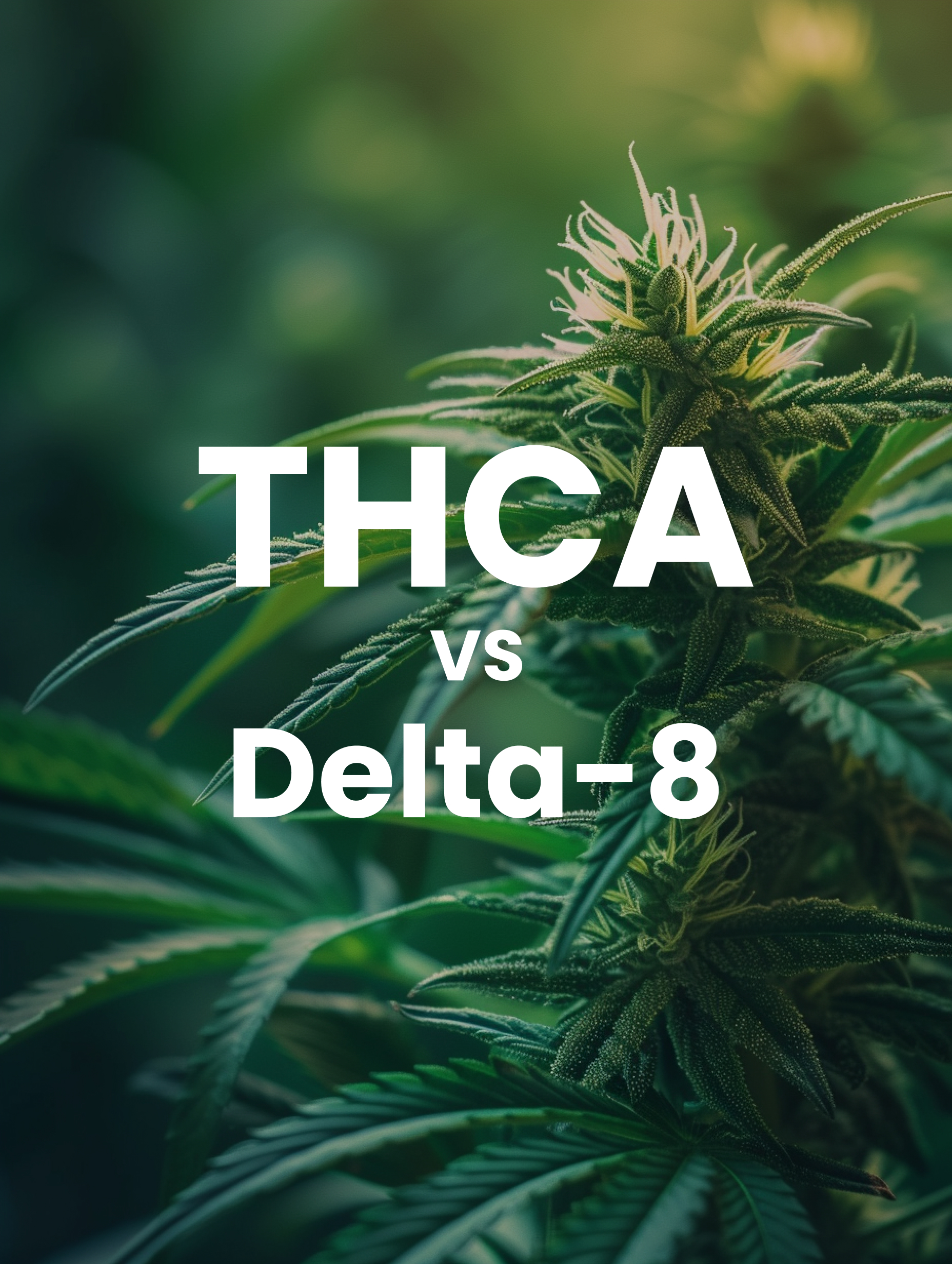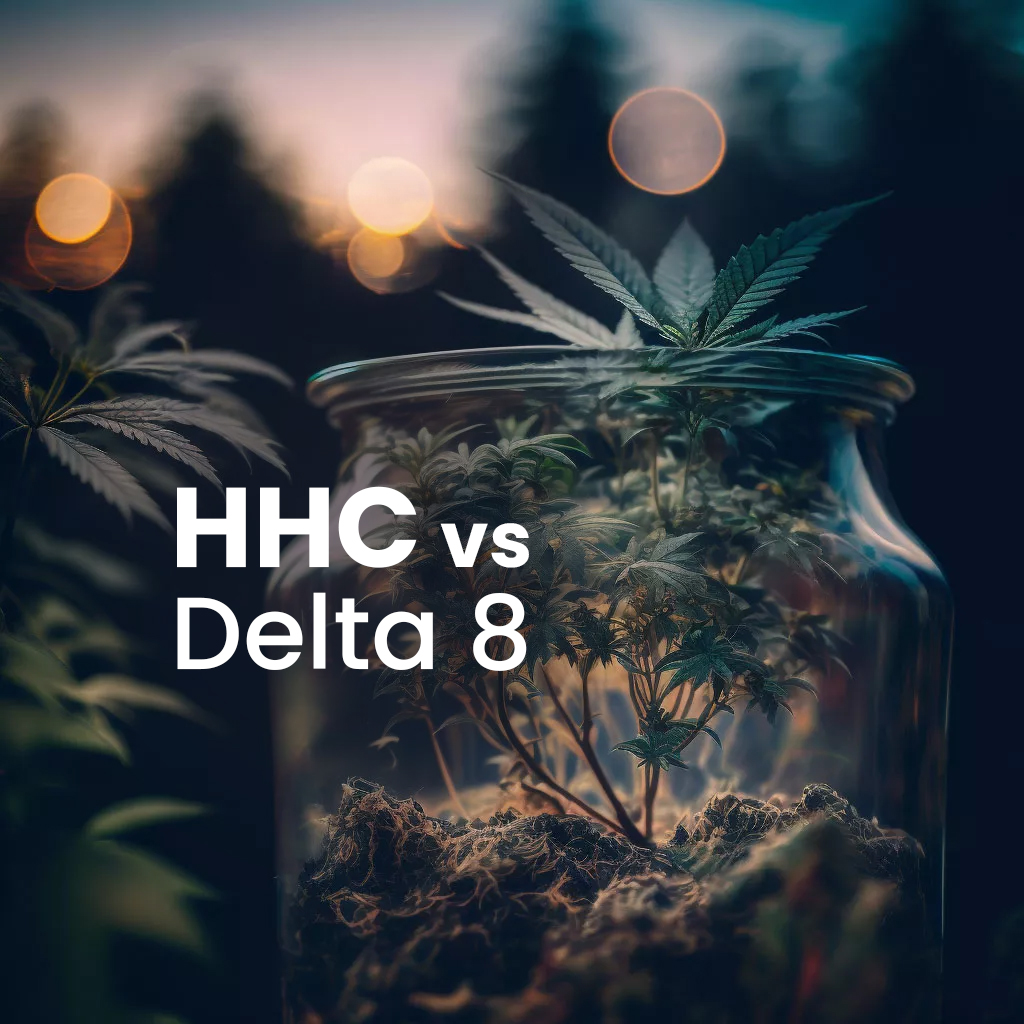HHC vs Delta 9
Get ready to geek out, because we’re about to dive deep into the fascinating world of hemp-derived cannabinoids. Specifically, we’ll be exploring the hottest new cannabinoid on the block – HHC – and seeing how it stacks up against the OG Delta-9 THC. HHC and Delta-9 THC are two hemp derived cannabinoids that interact with the endocannabinoid system to produce psychoactive effects.
With more cannabinoids to choose from than ever before thanks to changing attitudes and regulations around cannabis, it can get confusing trying to keep them all straight. That’s why we wrote this handy guide comparing HHC and Delta-9 so you can truly understand what sets them apart.
Whether you’re new to the world of cannabinoids or a seasoned consumer looking to expand your horizons, read on to get the real scoop on how these two trippy compounds compare when it comes to chemistry, effects, benefits, legality, and more!

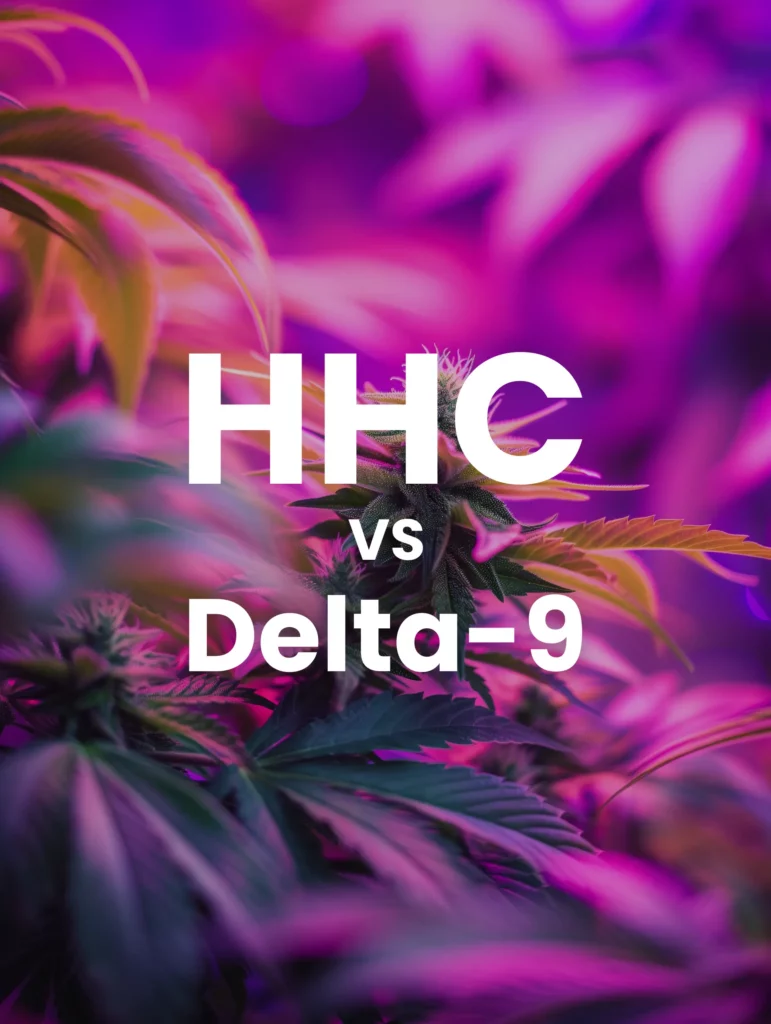
Key Takeaways
- Chemically similar but HHC is more stable
- Both are psychoactive but Delta 9 produces a more potent high
- HHC provides a lighter, more functional buzz for many users
- Delta 9 remains federally illegal, HHC is in a legal gray area
- Product options and consumption methods are comparable
- Delta 9 has more established medical benefits but HHC shows promise
- HHC may produce less anxiety and paranoia at recreational doses
- Effects, safety, and laws vary individually so research is essential
- For strong recreational effects choose Delta 9, for milder choose HHC
- Personal needs, preferences and local laws should drive selection
About HHC
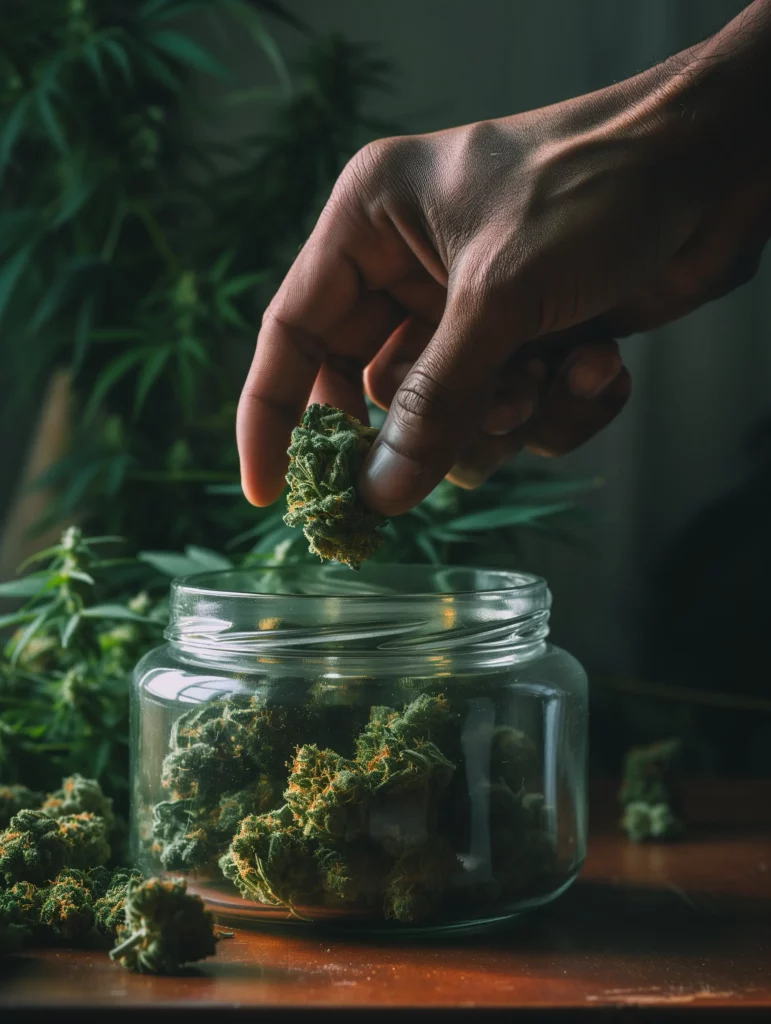
Let’s start with the new kid on the block: HHC, short for Hexahydrocannabinol. As you may have guessed from the name, HHC is closely related to THC (which stands for tetrahydrocannabinol, in case you didn’t know).
Chemically, HHC and THC are nearly identical twins, except HHC has hydrogen molecules in place of THC’s double carbon bonds. This hydrogenation gives HHC a more stable molecular structures while also subtly changing its effects.
The hydrogen molecules make HHC more resistant to degradation from environmental factors like light, heat, and oxygen exposure. So it maintains its potency better over time compared to THC.
As for effects, HHC delivers many of the same desirable feels as traditional THC – we’re talking euphoria, relaxation, sensory enhancement, and just an overall good time. But HHC tends to feel more clear-headed, energetic, and functional compared to THC’s more stoney vibes.
This makes HHC super appealing for recreational use and opens the door for all kinds of potential wellness benefits too. And the best part is it falls into a legal gray area thanks to its hemp derived products origins, making access way easier than traditional marijuana-derived THC.
About Delta 9 THC

Now onto the OG: Delta-9 THC. As one of over 100 cannabinoids found in cannabis, Delta-9 THC is by far the most famous thanks to its potent psychoactive properties. If you’ve ever taken a hit of weed, you’ve experienced D9 THC in action.
This cannabinoid works its magic by binding to receptors throughout the body, causing a wide range of effects like euphoria, relaxation and enhanced senses.
Recreationally it’s prized for being the key to achieving that amazing high that sets cannabis apart from other plants.
The downside is that Delta-9 remains federally illegal as a Schedule 1 controlled substance, even when derived from hemp. But the changing federal legal landscape has made D9 products more accessible in legal states, allowing more people to enjoy it.
Delta-9 THC is the most well-known form of THC, while delta 8 THC has become popular more recently for its milder high.
Now let’s get into the nitty gritty details on how HHC and good ole Delta-9 THC actually differ.
Chemical Structure and Differences
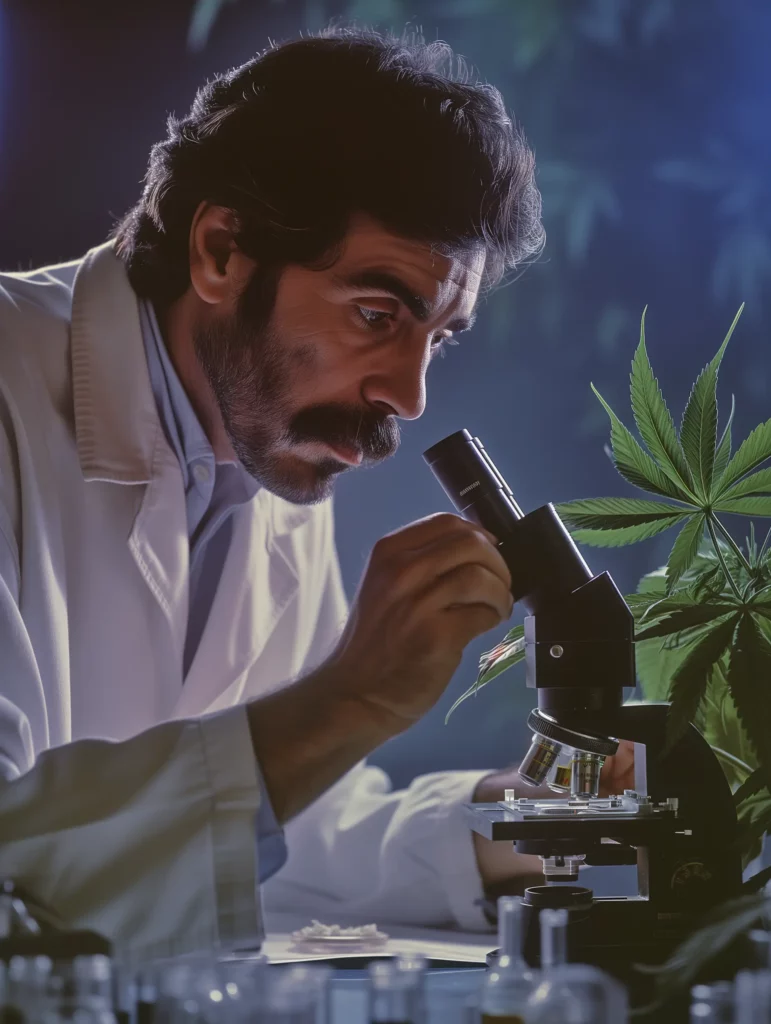
Despite having similar names, HHC and THC have some important structural differences. They are both tetrahydrocannabinols – meaning they have a four-ring structure with overlapping double bonds. However, HHC contains hydrogen molecules in place of Delta-9’s double bonds.
This seemingly small change has significant effects. The hydrogenation makes HHC more stable than THC. HHC also has a slightly different shape which changes its binding affinity to CB receptors.
Delta-9’s double bonds make it easier to oxidize and degrade when exposed to light, heat, or oxygen. HHC’s hydrogen molecules protect it from these environmental stressors.
So while their structures are comparable, the extra hydrogen atoms lend HHC better stability and a somewhat different effect profile. Understanding these molecular differences provides insight into how the two cannabinoids differ.
Psychoactive Effects

When it comes to intoxicating effects, both HHC and Delta-9 THC can induce euphoria, sensory alterations, time dilation, creativity, and general “high” feelings characteristic of cannabis. However, their specific effects differ in potency and quality.
Delta-9 is considered the gold standard for cannabis’ signature high. Its robust psychoactivity comes from strong binding affinity for CB1 and CB2 receptors. This makes its effects potent and long-lasting.
In contrast, HHC acts more selectively on CB1 receptors. It produces a shorter, lighter high described by some users as “cleaner” and more functional. The intensity also builds and fades faster compared to traditional THC.
Another key difference is that Delta-9 can induce more undesirable effects like anxiety, paranoia, sedation, and clouded mental states at higher doses. HHC has been generally reported as better tolerated, especially by those sensitive to THC’s effects.
At recreational doses, HHC provides a recreational high without being overly intoxicating for many users. However, experiences can vary dramatically based on the individual, dose, and product quality.
Legality and Availability
The legal status of HHC and Delta-9 THC differs significantly, even though they come from the same plant source. This comes down to where they fall under particular regulations.
Delta-9 THC remains a federally illegal substance, listed under Schedule 1 of the Controlled Substances Act since the 1970’s. While individual states have legalized it, transporting THC products across state lines remains illegal.
HHC has become more accessible thanks to the 2018 Farm Bill. This law legalized hemp and its derivatives, opening the door for HHC products since it comes from legal hemp.
Under the 2018 Farm Bill, hemp products must contain less than 0.3% THC content by dry weight to remain federally legal.
However, HHC exists in a legal gray area. Several states have banned it specifically, considering it an illegal synthetic compound. But in places where recreational cannabis is allowed, HHC is also permitted. It’s crucial to verify local laws before purchasing.
In terms of availability, Delta-9 THC products are ubiquitous in legal markets. HHC products are harder to find outside specialty retailers due to variable legality. Delta-8 THC has wider availability than HHC currently. But as HHC gains traction, access continues improving.
Choosing between HHC and Delta-9 will depend significantly on legal access in your region. Understanding these cannabinoids’ legal nuances enables selecting products aligned with your preferences and regional regulations.
Safety and Side Effects

Both HHC and Delta9 THC come with potential side effects, especially when consumed in excess. Common adverse effects include anxiety, rapid heart rate, dizziness, paranoia, dry mouth, and impaired coordination. However, HHC tends to exhibit a better safety profile.
D9 THC carries more risks like paranoia and anxiety even at moderate doses. It can also negatively interact with certain medications and pre-existing conditions due to its widespread receptor activity.
Comparatively, HHC appears less likely to cause anxiety or sedation. Its effects seem to plateau at a certain point, reducing the odds of overconsumption. Many users report HHC as smoother and easier on the mind and body even at higher doses.
That said, both compounds lower inhibition which can be problematic in certain settings. Operating vehicles or machinery is not advised when working with any intoxicating cannabinoid.
As with any substance, starting low and gradually increasing dosage based on personal tolerance is key. It’s also crucial to consider any health conditions when using cannabinoids of any kind.
Product Forms and Consumption Methods
Delta-9 THC and HHC are available in many of the same product types:
Flower
The dried, smokable buds of the cannabis plant are the classic way to consume THC. HHC flower is typically hemp sprayed or infused with HHC distillate.
Vape cartridges - view products
Concentrated THC or HHC oils in self-contained vape carts offer portable, discreet use. Great for easy microdosing.
Tinctures
Liquid cannabinoid extracts suspended in a carrier oil like MCT or coconut oil. Taken sublingually or added to foods and drinks. Provides longer lasting effects than vaping/smoking. Popular for precise dosing.
Edibles - view products
THC and HHC edibles like gummies, baked goods, or candies provide long-lasting effects through ingestion. Onset time is longer than vaping/smoking.
Topicals
Lotions, balms, and salves with cannabinoids are used for localized skin application rather than systemic effects.
For both HHC and Delta-9, inhalation through vaping or smoking provides the fastest onset and shortest duration. Oral ingestion has a slower onset but longer lasting effects.
Choosing the best method often comes down to personal preference, desired effects, convenience, and discretion. Having various product options lets consumers tailor the experience to their needs.
Potential Benefits and Uses
Delta-9 THC boasts a broader range of established benefits thanks to extensive research. However, HHC’s properties point to similar promising therapeutic potential.
The biggest difference arises in recreational use. Delta-9’s potent psychoactivity makes it the first choice for achieving a strong high sensation. HHC offers a lighter euphoria with less chance of adverse mental effects.
While more research is still needed, both cannabinoids showversatility whether for medical, recreational, or wellness applications.
Final thoughts
With cannabis regulations continuing to evolve, novel cannabinoids like HHC and delta-9 THC present more options for consumers. Understanding how these compounds differ in terms of structure, effects, safety, legal status and applications allows making an informed selection.
Both HHC and Delta-9 provide psychoactive experiences that appeal to recreational and wellness users. Delta-9 produces an intense, potent high that HHC mirrors in a more muted manner. As the cannabis market expands, further research into therapeutic potentials could identify specialized uses for each.
For now, evaluating personal preferences and needs against location-specific regulations will steer consumers toward the best choice between HHC and traditional THC. With sound information and responsible use, these intriguing cannabinoids offer promising new possibilities.
Frequently Asked Questions
What is the main difference between hhc and delta 9 THC?
The key structural difference is that HHC contains hydrogen molecules where Delta-9 has double carbon bonds. This makes HHC more stable and alters its effects.
Is HHC as potent as delta9 thc?
Delta-9 THC is considered more potent and intoxicating due to its strong binding affinity for CB receptors HHC has milder psychoactive effects.
Can HHC cause a positive show up on a drug test test result?
Yes, drug test can find hhc. HHC can trigger positive results for THC metabolites on standard drug tests. Those subject to screening should avoid HHC.
Legal concerns?
Delta-9 remains federally illegal, while HHC exists in a gray area leaning toward legal. But state and local laws vary in both cases.
The statements on this blog are not intended to diagnose, cure, treat or prevent any disease. FDA has not evaluated statements contained within the blog. Information on this website or in any materials or communications from Inheal is for educational/informational purposes only and is not a substitute for medical advice, diagnosis, or treatment. Please consult your healthcare provider before making any healthcare decisions, correct dosage or for guidance about a specific medical condition.

A connoisseur of cannabis creativity and true contemplation with more than 20 years of experience, Chris extracts deep thoughts from getting lightly baked and shares his wandering mind. He blends cuisine and cannabis culture into nutritious, delicious recipes and insights for other hemp lovers.
Related Posts

THCA vs Delta 9

THCA vs THC: What’s the Difference?

THCA vs Delta 8: Differences and Similarities

Delta 8 vs Delta 9: Which One Truly Reigns Supreme?

Comparing HHC vs Delta 8: Which is Right for Me? – Inheal

Is HHC Legal in Your State? Everything You Need To Know

Will HHC Show Up On A Drug Test? The Comprehensive Guide

Which Cannabis Products Can Help You Stay Productive?

Cannabis and Sex: Tips for Better Sexual Intimacy
All Posts



